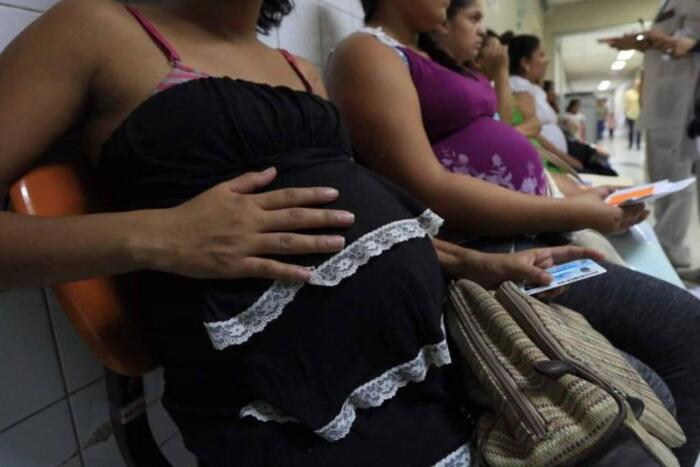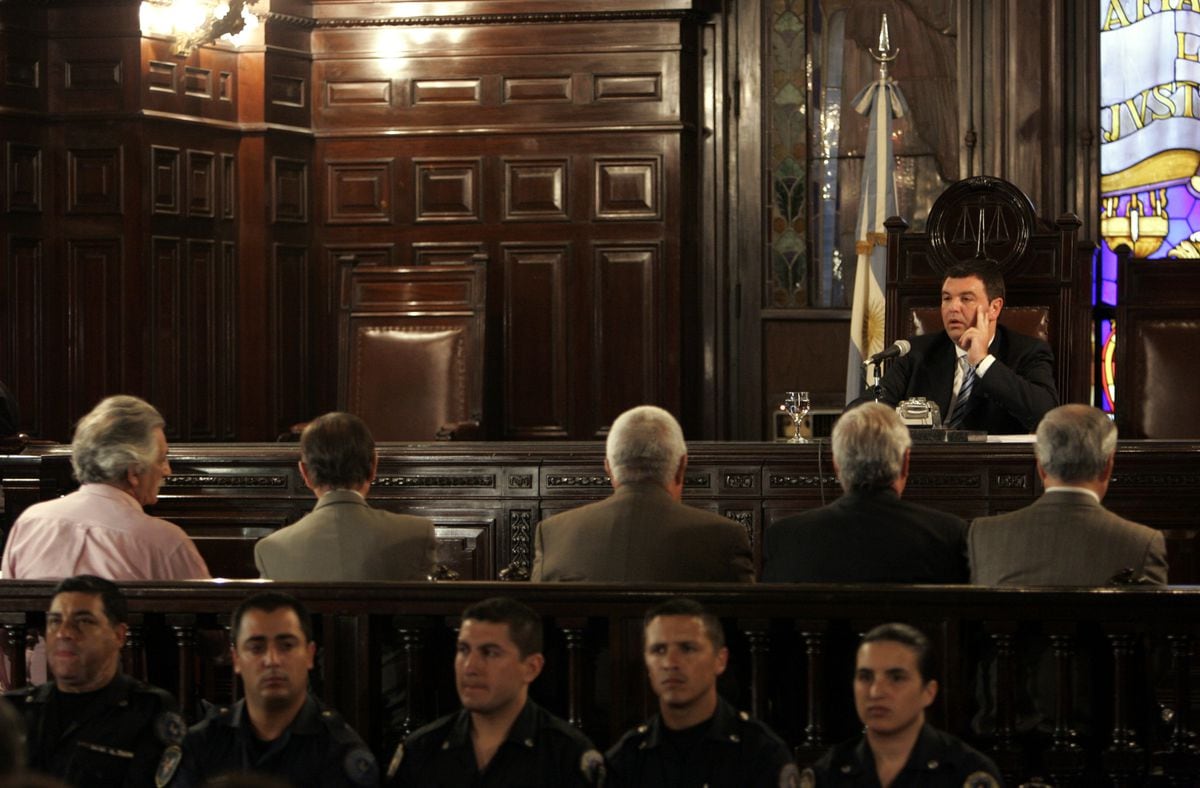Demonstrators celebrate the sanction of the law of voluntary interruption of pregnancy, in the early morning of December 30, 2020. Juan Ignacio Roncoroni / EFE
On March 8, 1984, the feminist María Elena Oddone demonstrated with a huge banner that read: "No to motherhood, yes to pleasure."
It was the first march for International Women's Day after the return of democracy from Argentina and in the streets the decriminalization of abortion began to be demanded.
Even then, Oddone argued that "no one has to explain to us the three pillars on which female oppression is based: motherhood, sexuality and domestic work."
More than three decades passed until, on December 30, women won the right to decide about their bodies and their life projects.
Interrupting a pregnancy safely will no longer be a privilege for those who can pay for it, but will be available to all who need it.
“It seemed that we were head to head and each time they wanted to impose more things on us, I was very afraid that it would not come out.
We begged him to come out even for a vote and at the end I yelled 'We have more votes, we have more votes ”, recalls by phone the lawyer and historical activist Nina Brugo about the decision of the Argentine Senate, which approved the voluntary interruption of pregnancy until the week 14 by 38 votes in favor, 29 against and one abstention.
Two years earlier, the same chamber had rejected it by a difference of seven votes.
Argentina, a pioneer on the continent in laws such as equal marriage - approved in 2010 - and gender identity - 2012 -, on the other hand, maintained for 99 years the prohibition of abortion except in cases of rape and risk to the mother's health.
Why the delay?
“Legal abortion improves the lives of women and if patriarchy is afraid of anything, it is to strengthen women.
It is to fight for our autonomy and our sexual freedom ”, answers Brugo.
It maintains that equal marriage is not disruptive, it includes people within an institution and the social order.
On the other hand, legalizing abortion means separating pleasure from the reproductive purpose, ending the idea of women as incubators.
On March 8, 1984, María Elena Oddone, a reference to a feminist group, climbs the steps of the monument of the Two Congresses, carrying a banner that questioned the main and almost exclusive role that the patriarchy had assigned to the sexuality of women.
pic.twitter.com/d09Nc6AFPN
- Buenos Aires in the memory (@BsAs_recuerdo) March 8, 2018
Brugo became a member of the military in favor of legal abortion 30 years ago and vindicates the work carried out in the National Women's Meetings - held annually since 1986, each time in a different city - to raise awareness about the problem of unsafe abortions performed in the secrecy.
More than 3,000 women have died in the country in the last 37 years due to interrupting their pregnancies in unsafe conditions, with methods such as catheters, perches or parsley, among others.
Tens of thousands have had to be hospitalized for complications.
The symbol of the green scarf
It was at the 2005 Women's Encounter when the National Campaign for the right to legal, safe and free abortion was founded, which brings together more than 500 groups throughout Argentina.
From that union came the green scarf, which has become the symbol of the struggle in favor of legalization, first in Argentina and later also in the entire region.
During the campaign, the legislative projects that were presented up to eight times in front of Congress were forged and in which the Executive of Alberto Fernández was inspired to draft the text that was finally converted into law.
"Our claim is not only a response to the death of women, for not having the possibility of having an abortion in aseptic conditions in a public hospital. It is something much more profound that touches on equality, democracy, to freedom. "
Dora Coledesky pic.twitter.com/965j1HyMlu
- Law 27.610 💚 (@PorAbortoLegal) December 31, 2020
Its predecessor was the Commission for the Right to Abortion (CDA), founded by doctor Dora Coledesky in the late eighties, after her return from exile in France.
Contact with feminist movements abroad and experiences outside the country were key to promoting the struggle in Argentina, says Fernández's sociologist and advisor, Dora Barrancos.
“I had an abortion twice in my life and in one of them I almost died.
It was in Brazil, during exile, in horrible conditions, because he was a horrible doctor.
The clandestinity of abortion in Brazil was much more ominous than here, ”recalls Barrancos, who declares herself“ very happy ”about the sanction of the law.
“Argentina is today a slightly fairer, more egalitarian and more dignified country.
The page of secrecy, of stigmatization, shame and death is left behind.
At the time the sanction of the law was established, we were all in an outpouring of total emotion and like gusts came to my impressions the thousands of preventable deaths that occurred in this country ”, he says.
One of the hardest moments in the fight for legal abortion was the 1990s, under the presidency of Carlos Menem, when the religious opposition was joined by the government one.
The president tried to further limit this right by unsuccessfully promoting its total ban in the country in the reform of the Constitution.
Despite the defeat, in 1998 he established March 25 as the Day of the Unborn Child, a celebration led by the then Archbishop of Buenos Aires, Jorge Bergoglio, today Francisco.
Now Menem, with 90 years, is the oldest senator, but he could not vote against the law because he was hospitalized in serious condition.
The conservative offensive of the 1990s did not stop feminist militancy in demonstrations, meetings and even from areas such as the musical: in 1997 the punk groups Fun People and She Devils released the album 'Illegal abortion murders my freedom'.
Inside it included a poster to be photocopied and pasted on the streets of the country.
Still, the fight for legalization was intense, but marginal for decades.
The break of Not One Less
The great leap occurred in 2015, after the irruption of the Ni Una menos movement against sexist violence, which managed to mobilize hundreds of thousands of people and impose women's rights on the political agenda.
“Feminist activism existed, but it was very disjointed.
With Ni Una menos we managed to network together those of us who came from different places, we realized that we were not alone and of all that we could achieve if we stayed together ”, says communicator Ana Correa, one of the founders.
Since then, the mobilization in the streets has been massive and constant.
The youngest girls took legal abortion as their flag in a green tide that achieved legislative treatment for the first time in 2018. Although it failed, its impact was enormous: abortion was no longer taboo.
Television programs with a large audience spoke for the first time about the use of pills to interrupt a pregnancy and the support networks that exist to try to minimize the risks of those who abort in hiding.
“In these years feminisms stopped being conceptual and became popular, there was a total spill.
It happened in Argentina, which is a paradigmatic example, but also in Chile, Mexico, Uruguay and other Latin American countries.
And feminisms also welcomed sexual diversities, they united to win rights ”, highlights Barrancos.
The feminist advance and social decriminalization in turn led to the hardening of the religious discourse against it.
"Abortion was the last quarry of resistance of the Church and had made a complete abroquemiento," says Barrancos.
The most religious provinces in the north of the country received a large part of the negative votes in the Senate.
“We have the law, but the work is not finished because we have to ensure that it is enforced.
For decades the 1921 legislation was not complied with, they did everything possible to obstruct it ”, warns Brugo.
Girls between 10 and 12 years old who were raped and demanded to have an abortion saw their cases being prosecuted and weeks passed without their will being carried out.
Even in the face of danger to the mother's life, the right was not always guaranteed: in 2006, 19-year-old Ana María Acevedo died after doctors refused to give her radiation therapy for cancer because she was pregnant.
Her request to terminate the pregnancy in order to be cured was also ignored, but it set a judicial precedent: for the first time the Supreme Court convicted doctors of culpable injuries and breach of public official duties by refusing to perform a legal abortion.
- I deeply regret for the lives of Argentine children, now subject to serem ceifadas no ventre of their more with the State's consent.
Not that it depends on me and my government, or abortion will never be approved by us alone.
We will always fight to protect two innocent lives!
- Jair M. Bolsonaro (@jairbolsonaro) December 30, 2020
The struggle for implementation will be accompanied by efforts to extend this right to the rest of the continent.
“There is a concern of the most conservative sectors, that is why Bolsonaro immediately came out with a tweet against it.
But we are convinced that the contagion effect will be inevitable ”, predicts Correa.
Brugo agrees: “We are connected to the world.
Legal abortion in Argentina makes the struggle of the compañeras in the rest of Latin America easier ”.




/cloudfront-eu-central-1.images.arcpublishing.com/prisa/AWQDFA55JRFZ7EFY4XGGS3VAVQ.jpeg)
/cloudfront-eu-central-1.images.arcpublishing.com/prisa/2XWZK2SNNVHNTOU6DYROGV3XVI.jpg)

/cloudfront-eu-central-1.images.arcpublishing.com/prisa/2BJPLFOPENCKDMK6PPADXUU37E.jpg)

